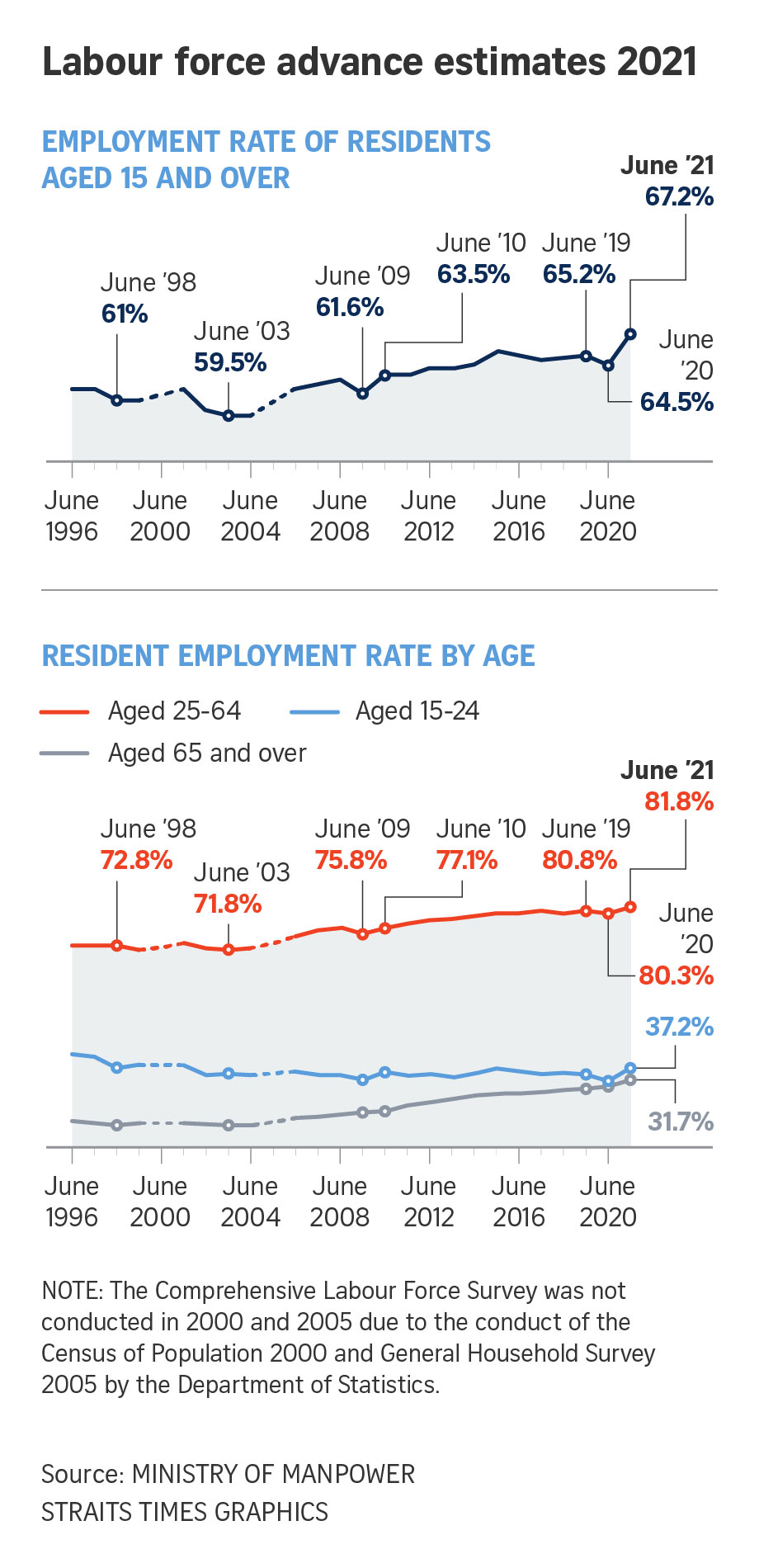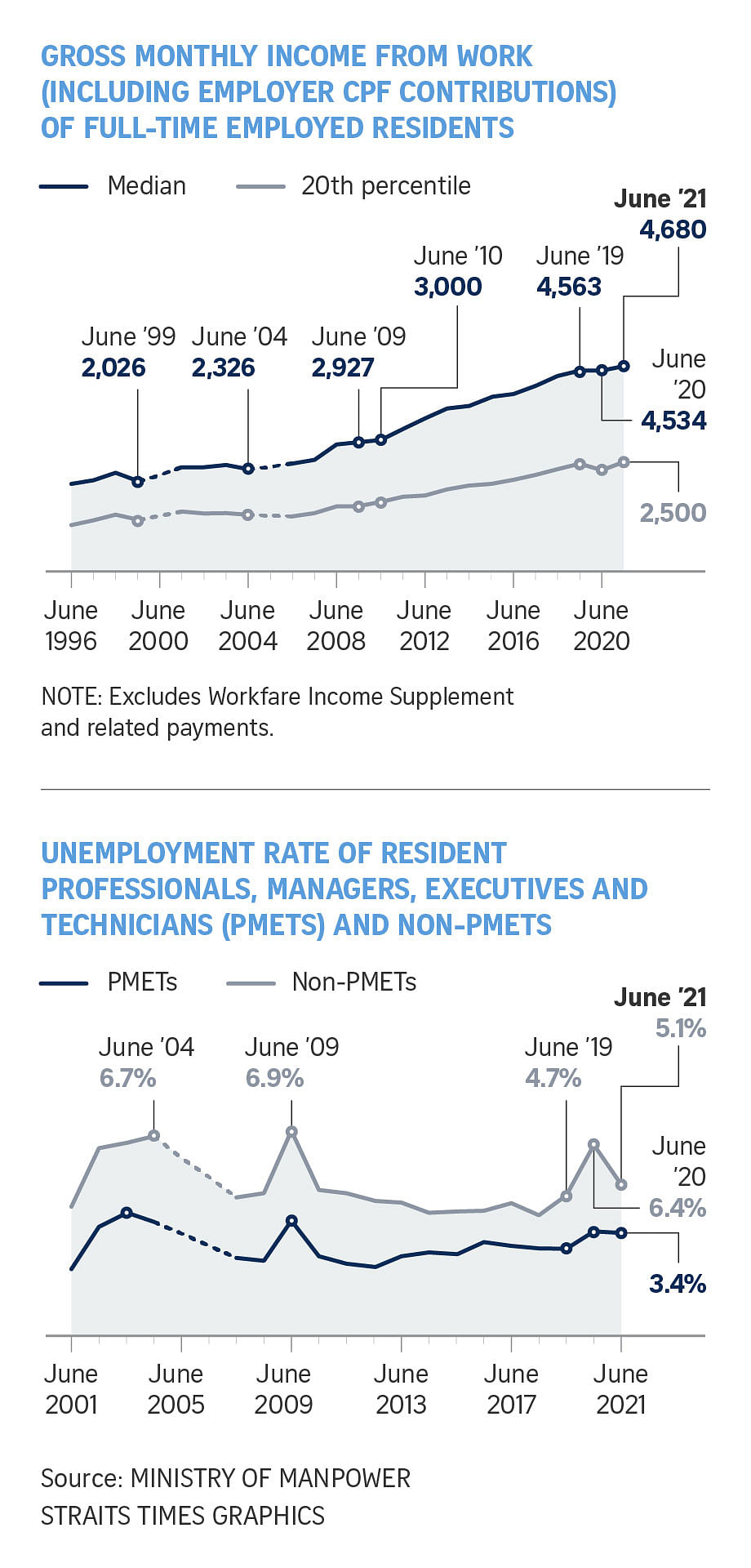SINGAPORE - Singapore's labour market is slowly recovering - with more people being employed and incomes rebounding - but resident unemployment rates remain elevated, according to advance estimates released by the Ministry of Manpower (MOM).
The median income of residents - Singaporeans and permanent residents - rose above pre-Covid-19 levels this year, rebounding from last year when it took a hit for the first time in 16 years because of the pandemic.
The overall employment rate of residents aged 15 and above also grew to 67.2 per cent in June, up from 64.5 per cent a year earlier, the ministry said in its annual report on Wednesday (Dec 1). This is also higher than the 65.2 per cent in June 2019.
A further breakdown showed that the improvement was broad-based across various groups, owing to the economic recovery and support measures such as the SGUnited Jobs and Skills Package and Jobs Growth Incentive (JGI), MOM highlighted in its report, which is based on mid-year data.
The employment rate of youth aged 15 to 24 jumped to 37.2 per cent in June, from 30.9 per cent a year ago. This was mainly due to more students taking on part-time or temporary work on the side, said the ministry.
For residents aged 25 to 64, this rate grew to 81.8 per cent in June, from 80.3 per cent the year before. At the same time, the rate for seniors aged 65 and above rose to 31.7 per cent, up from 28.5 last year.
On Wednesday, Manpower Minister Tan See Leng said: "While we see improvements being made in strides, we have to bear in mind that we are not fully back to pre-Covid-19 levels, and we are not completely out of the woods, especially when there's so much news of world governments, healthcare systems grappling with the new Omicron variant."
His ministry said it expects the labour market recovery to continue into 2022, "but in an uneven manner across sectors".
Unemployment figures, for instance, have remained elevated. This is despite the rates improving over the year.
The resident unemployment rate for professionals, managers, executives and technicians (PMETs) edged down slightly to 3.4 per cent in June, from 3.5 per cent a year earlier. For resident non-PMETs, the rate fell to 5.1 per cent, from 6.4 per cent.
The resident long-term unemployment rates, which look at those who have been unemployed for 25 weeks or more, held steady at 0.8 per cent for PMETs and 0.9 per cent for non-PMETs after increasing last year.
MOM said this elevated long-term unemployment rate compared with before the pandemic suggests that some displaced workers faced challenges in their job hunt.
Maybank Kim Eng economist Chua Hak Bin attributed this to the uneven labour market recovery. "Displaced workers from distressed sectors, such as hospitality and retail, may face difficulties in securing jobs in the fast-growing sectors like finance and tech because of skills mismatches," he added.
In the latest monthly update on unemployment given by MOM on Wednesday, the overall rate remained unchanged in October, at 2.6 per cent.
The resident unemployment rate fell to 3.4 per cent in October, from 3.5 per cent in September. The rate for citizens also fell slightly, from 3.7 per cent to 3.6 per cent.
Despite this, 88 per cent of resident employees were in permanent roles, said the MOM report. It added that the number of residents on permanent employment grew by 50,900.
An increase in demand for temporary labour for Covid-19-related activities and economic uncertainty led to a new high in the share of those on fixed-term contracts at 8.4 per cent. This was an increase from 7.3 per cent last year, and was driven by more residents taking on contracts of less than one year.
As at end-September, more than 146,000 job seekers have been placed into jobs, attachment and training opportunities under the SGUnited Jobs and Skills Package, said MOM.
The JGI, which supports firms to expand hiring of local job seekers, helped 58,000 businesses hire more than 400,000 locals between September last year and May this year.
In its report, the ministry also highlighted how full-timers put in fewer hours of work per week, compared with a decade ago. Full-time employed residents worked an average of 45 hours a week this year, compared with 49.2 hours a week in 2010.
Meanwhile, the nominal median income of residents - Singaporeans and permanent residents - grew by 3.2 per cent to $4,680 in June, from $4,534 in June last year. This was after it dipped by 0.6 per cent last year.
After taking inflation into account, the growth in real median income was smaller at 1.1 per cent, a reversal from the 0.4 per cent decline the previous year, MOM said. The income data is for people in full-time employment and includes employer Central Provident Fund contributions.
Those earning less saw their incomes recovering to levels before the pandemic hit.
Real income of full-timers at the 20th percentile rose by 4.6 per cent, not including government payouts.
MOM said that if government payouts to lower-income workers are considered, such as the Workfare Income Supplement, the income at the 20th percentile this year surpassed its pre-Covid-19 level by 0.6 per cent per annum.
Over the five years from 2016 to this year, the real income growth of lower-wage workers "remained strong, enabling them to continue to gain ground on median incomes", the ministry said.
Bolstered by efforts such as the Progressive Wage Model to improve their salaries, the real income growth of full-timers at the 20th percentile was 2.8 per cent per year, higher than the median of 2.2 per cent per year.
Dr Tan, speaking to the media after visiting staff at Raffles Hotel on Wednesday, said his ministry will focus its efforts on supporting employers in adapting their businesses and preparing workers for future jobs.
"We also have to take a longer-term view to look at how industries and job roles will pivot and transform."
National Trades Union Congress assistant secretary-general Desmond Choo on Wednesday said there is a need to consistently review structural issues within the job market, such as mismatches between skills and expectations.
"In looking ahead, we should still be mindful that inflation may erode some on the gains from wage growth," he added in a Facebook post.




